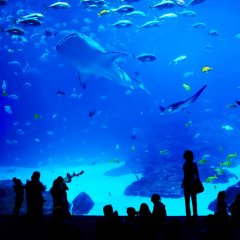World Ocean Radio - Ocean Literacy

This week marks the 750th episode of World Ocean Radio: 15 years of weekly short audio that reaches millions around the globe, sharing concepts, demands, and solutions related to ocean technology and science, policy, examples of best practice, personal reflections, and solutions for how the ocean connects, sustains, inspires, and engages us in common history, traditions, sustenance, communication, community, and well-being. Thank you for listening!
This week on World Ocean Radio, two new books for readers to consider this fall: "The High Seas: Greed, Power, and The Battle for the Unclaimed Ocean" by Olive Heffernan, and "What the Wild Sea Can Be: The Future of the World Ocean" by Helen Scales. Both books evoke hopeful possibility while exploring the extent of the ocean and the implications of ongoing exploitation and excess.
"The state of the ocean is not good." So states Vidar Helgesen in the forward to the UNESCO Intergovernmental Oceanographic Commission (IOC) State of the Ocean Report that was released in May. This week on World Ocean Radio we are summarizing the findings.
A November visit to Gloucester Massachusetts for an Ocean Literary Conference (NEOSEC 2023) afforded W2O staff an opportunity to take a field trip to the Gloucester Marine Genomics Institute. Founded in 2008, the Institute is on the cutting edge of 21st century science, studying the marine environment for solutions to issues facing the ocean, sustainably fisheries, human health, to better understand ecosystems, and the ocean's medicinal value for today and tomorrow. In addition to their state-of-the-art research laboratories, GMGI is promoting technical training for lab techs through their Biotechnology Academy, a no-cost, year-long certificate training program with astonishing results.
This week we continue the multi-part RESCUE series with a highlight of the World Ocean Explorer virtual aquarium project of the W2O, an innovative tool by which to present responsible science, innovative education, and a unique virtual experience freely accessible to all. For further information, to promote and support, please visit worldoceanexplorer.org. Dive deep, share with your children and grandchildren, and spread the word. RESCUE as an acronym offers a plan for specific action and public participation: Renewal, Environment, Society, Collaboration, Understanding, and Engagement.
This week on World Ocean Radio we continue the RESCUE series with recommendations to further protect the ocean--by building ocean literacy into every level of education and action around the world.
"The ocean supports a great diversity of life and ecosystems." So states the fifth Ocean Literacy principle, a series of fundamental concepts to help us better understand the ocean's influence on us and our influence on the ocean. World Ocean Radio's Ocean Literacy series continues this week with a discussion about the complex diversity contained in the world ocean and the ways that such systems, relationships and processes might be observed and understood for scientific gain. This episode is part six of an eight-part series on Ocean Literacy, an anthology of reflections, examples and illustrations that represent responses to the ocean and the environmental challenges we face.

